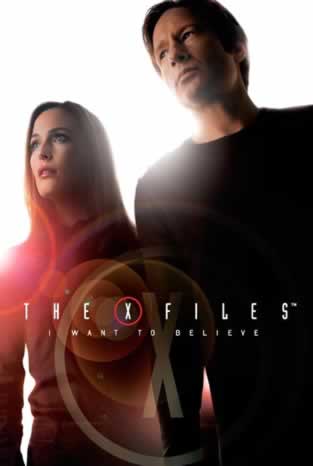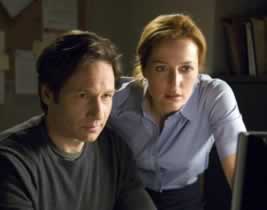


THE
X FILES
I WANT TO BELIEVE
A Review and further musings by Alexios Gatzoyas
To begin with, as the tag line of this website says, Just One Opinion on the Movies, the following should be read as such; an opinion from a fan of The X Files who just watched the second X Files film.
 Apropos
at this point a brief background on my personal experience of The X Files
would facilitate to contextualise the following review of the aforementioned
film. Arguably it is a well-known fact that the television series The X
Files has been unique and extraordinary not only as a worldwide television
phenomenon during the 1990's, but as a series in itself, setting new cinematic
standards of filming for television. Numerous Film Studies and other academics
have written a plethora of essays, articles and case studies discoursing
how The X Files has influenced many televisions series that ensued, and
even, as many argue, how it helped to shape the landscape of the post-90's
US television production values and type of television storytelling, as
well as audience expectations. For me The X Files was something that grabbed
my imagination, attention and interest on many levels, all positioned securely
away from the realm of 'The X Philer'.
Apropos
at this point a brief background on my personal experience of The X Files
would facilitate to contextualise the following review of the aforementioned
film. Arguably it is a well-known fact that the television series The X
Files has been unique and extraordinary not only as a worldwide television
phenomenon during the 1990's, but as a series in itself, setting new cinematic
standards of filming for television. Numerous Film Studies and other academics
have written a plethora of essays, articles and case studies discoursing
how The X Files has influenced many televisions series that ensued, and
even, as many argue, how it helped to shape the landscape of the post-90's
US television production values and type of television storytelling, as
well as audience expectations. For me The X Files was something that grabbed
my imagination, attention and interest on many levels, all positioned securely
away from the realm of 'The X Philer'.
Suffice it to say I was eagerly anticipating the second X Files film, yet consciously with much reserve, in an attempt to enter the cinema with as much open and unbiased mindset as possible, with enthusiasm nonetheless.
Overall, I believe that the film could be looked at from two different audience perspectives; that from an X Files fan; and that from a regular cinema goer who is not familiar with 'The X Files phenomenon' of the 90's. Regardless, looking at the vast array of approximately 202 episodes, the 'world' of The X Files is immensely rich and diverse in terms of the genre, style and thematic scope of the stories that it has dealt with in the past. The latter does not take into account the story arc of the 'mythology' that has been the backdrop for both the original television series and its first cinematic outing, i.e. the conspiracies by the US government and FBI in an attempt to hide from the general public the knowledge of the existence of extra terrestrials and their planned invasion/colonisation of Earth on December 22, 2012. Apropos one could argue that the scope of the script for the second X Files film was a blank canvas on which an imaginative, intriguing, original, unique and jaw dropping story could be drawn. Alas this was not the case here!
The X Files: I Want to Believe was written by Frank Spotnitz and Chris Carter; the first was one of the co-executive producers/producers of the television series; the latter was the executive producer and creator. For those who have followed the television series would remember that some of the most memorable two-hour and three-hour long story arcs were penned by Chris Carter. By common acknowledgement from the creative team behind the series, Chris Carter's role has been paramount to the creation, development and sustainability of the series' unique aesthetic, structural and diagetic footprint; elements that have earned the series numerous awards, yet more importantly, its unique distinctiveness, kudos and prestige for audiences around the world.
Nevertheless, one cannot help but wonder where such characteristics can be found within the film, if at all. The story, although positioned well within the realm of The X Files world, it is far from unique; a subject matter that has been dealt with, in one form or another, in numerous occasions by a plethora of other television series and films. One could argue that regardless, the story still had potential, should it have been treated in collaboration with key members of the television series' creative and directorial team such as Rob Bowman and Kim Manners to name but a few. Regrettably these names were nowhere to be found on the film's end credits. The narrative is fragmented, with many plot development points being perturbed by continuous inserts of exposition by the film's two protagonists.
It is believed that this exposition was designed to satisfy the requirements of the two different types of audiences watching this film. The television series finished in 2002, where the characters of Mulder and Scully were left out of work from the FBI, with the X Files, as an FBI department, being shut down. The fans finally see their duo of heroes together as a couple, yet facing an unknown future. The first film established solidly who these two characters are as well as the aforementioned 'mythology'. Six years have passed since the series' finale, and ten years since the last film, ergo the need to update the audience on what our characters have been up to in the meantime, was an avoidable and necessary ingredient of this film's script. This also included exposition for the benefit of the non-fans, who had to become aware of the background of these two characters; such as William, the child of Mulder and Scully; the sacrifices that these two had to make during their work on the X Files with the FBI and much more.
Nevertheless, the writer here feels that this was approached in a much linear and basic style and manner, without the use of any of The X Files distinctive storytelling devices nor its unique codes and conventions; more importantly by underestimating the audience's intelligence, in terms of how this exposition was integrated within the film. At the same time, Chris Carter is known for his exposition-heavy, 'wordy' scripts; one only has to watch again the series' two-hour finale to understand this, where for approximately 60minutes the 'action' is situated within the confines of a court room dialogue. In the past, scripts such as these have been successfully put on the screen by the skilful hands and direction of the likes of Rob Bowman and Kim Manners. In this instance the film has been directed by Chris Carter instead, whose directorial attempts are generally very limited and primarily found within The X Files. One only has to examine more closely episodes directed by Chris Carter to realise that directing is not one of his strongest points.
Thus bringing us to the actual film, where two very talented actors along with the remaining acting ensemble entrusted themselves to this particular director. The results are varied; Gillian Anderson and David Duchovny are simply left to re-prise their roles six years on, with no apparent and adept directorial attempts to tap into their acting capabilities; hence to bring out stronger performances, as they have proven in the past that they are capable of doing most skilfully and effortlessly. This resulted in not bringing out into the foreground that quintessential 'chemistry' that these two actors are capable of creating and enriched their two characters with in the past. Moreover, it could be argued that the direction lacked that special X Files 'cinematic' mise-en-scene and feel, as well as multilayered structure and construct. The writer at this point purposely acknowledges the oxymoron here since this is a review is about a film.
Nonetheless, the film is enriched with many small details, carefully placed within the diegetic world of the film, for the fans to read and engage in an additional reading of the text. Perhaps these function as a reminder to the fans that they are not forgotten. Hence a fan embarks on an interplay of 'in-house' references throughout the film, by identifying elements such as the protagonists' idiosyncrasies and eccentricities; Mark Snow's iconic signature theme music; or Mulder's poster of a UFO with the caption "I Want to Believe", cleverly and quietly reinforcing the title of the film as well as the driving force behind Mulder's motivation for his quests into the paranormal, to name but a few.
Another interesting element that is present within the film is the signature debate between Mulder, the believer, and Scully, the sceptic/scientist. This is a joy for the fans to watch, as it resonates from countless similar conversations from the television series, which were and still are at the core of the relationship of our two protagonists.
One, however, cannot help but wonder whether all of the above and much more were overshadowed and possibly undermined by the story itself, dealing with some very real, ephemeral and serious subject matters such as paedophiles, religion and animal cruelty. Religion, and faith and Christianity more specifically, has been a part of Scully's character and part of the ways of dealing with, accepting and understanding the immense personal sacrifices and trials that her character had to endure over the nine-year run of the series. Nevertheless, such notions of faith and belief were always explored and dealt with delicately by juxtaposing these very cleverly and most skilfully with Mulder's own beliefs; thus at times encouraging the viewer to engage on additional reflections, and some argued, on a philosophical level too. Yet it could be argued that this is not the case in this film, as the story appears to embark on what could possibly be perceived as a religious and social critique and commentary. This on its own is not problematic; nonetheless one could debate whether it was appropriate for this film in particular, whose main function was to re-establish and re-introduce the fictional world of The X Files, its universe, style and characters, ten years after its first cinematic outing, to a primarily cinema audience, old and new.
Over the past few months a lot has been written about the reasons why this second film has been delayed for such a long period of time; about what the creator's and cast's intentions are for the X Files franchise to continue with cinema releases only; about the amount of effort that Chris Carter put into financing this film; about the story potential that the fictional world of The X Files has; and much, much more. If any of this information is to be true, as a viewer first and then as an X Files fan, this has little impact on my personal perception, reading and anticipation of this film.
At the same time, however, taking into account the cold reality of the global economics of the Hollywood film-studio industry, one fears that this film could be the last in the franchise. Should ticket sales are not at the acceptable levels, then this franchise could no longer be an economically viable media product.
Perhaps The X Files hit the world's small screens at the appropriate period of time, and perhaps, nowadays, well into the first decade of the twenty-first century where the notions of 'escapism', 'sci-fi drama' and 'reality' within the Media have been substantially redefined both as genres as well as ideas, perhaps such media products as The X Files no longer have the same place in people's entertainment agenda.
 Or
perhaps, as it has happened in the past, world-wide cinema ticket and home
video sales; pay-per-view rentals and other similar market revenues, could
be enough to sustain a third film. Then perhaps the creative team behind
this franchise could learn valuable lessons from their mistakes; they could
'listen' to the demands of the new market hence perhaps they could be able
to adjust a very successful formula. . .Perhaps all this is merely a case
of 'hope dying last'.
Or
perhaps, as it has happened in the past, world-wide cinema ticket and home
video sales; pay-per-view rentals and other similar market revenues, could
be enough to sustain a third film. Then perhaps the creative team behind
this franchise could learn valuable lessons from their mistakes; they could
'listen' to the demands of the new market hence perhaps they could be able
to adjust a very successful formula. . .Perhaps all this is merely a case
of 'hope dying last'.
Nevertheless, I, for one, Want To Believe!
Alexios Gatzoyas
The Usher Home | Hush, Hush... | The Big Story | The Usher Speaks
Stuck @ Home | Coming Soon | Links | Contact the Usher


![]()

Star
Wars Memories
Share
your feelings about the end of the Star Wars Saga
Something
Wicked This Way Comes
A
look at Harry Potter and the Prisoner of Azkaban
What was the best in 2003?
What was hot and what was not in 2002
Harry Potter enters the Chamber
The young wizard's second year at Hogwarts
A look back at the Star Wars Phenomenon
Five Guidelines for making a movie a hit
Who should go home with a Golden Statue?
What was hot and what was not in 2001
Harry Potter and the Philosopher's Stone
A Muggles Guide to witchcraft and wizardry
![]()